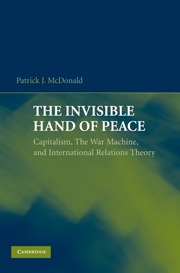Book contents
- Frontmatter
- Contents
- List of Tables
- Acknowledgments
- 1 American Grand Strategy and the Liberal Peace
- 2 Liberal International Relations Theory on War
- 3 Releasing the Invisible Hand
- 4 Liberal Economic Institutions and Peace in the Twentieth Century
- 5 Free Trade and Peace in the First Era of Globalization
- 6 From Rivalry to Friendship
- 7 The Achilles' Heel of Liberal International Relations Theory?
- 8 Peace Across the Taiwan Strait?
- 9 The Invisible Hand or the Ballot Box?
- 10 Capitalism and America's Peaceful Market Power
- References
- Index
2 - Liberal International Relations Theory on War
Published online by Cambridge University Press: 05 June 2012
- Frontmatter
- Contents
- List of Tables
- Acknowledgments
- 1 American Grand Strategy and the Liberal Peace
- 2 Liberal International Relations Theory on War
- 3 Releasing the Invisible Hand
- 4 Liberal Economic Institutions and Peace in the Twentieth Century
- 5 Free Trade and Peace in the First Era of Globalization
- 6 From Rivalry to Friendship
- 7 The Achilles' Heel of Liberal International Relations Theory?
- 8 Peace Across the Taiwan Strait?
- 9 The Invisible Hand or the Ballot Box?
- 10 Capitalism and America's Peaceful Market Power
- References
- Index
Summary
The expansion of individual liberty promotes peace between states by limiting governmental abuses of political authority, particularly manipulations of external threat for domestic political gain. This classical insight has served as the foundation for liberal international relations theory, including the contemporary democratic peace research program. According to this line of reasoning, governments often wage war for particularistic or selfish reasons that undermine the broader welfare of society while simultaneously fortifying the domestic political status of the governing elite. To prevent war, society needs mechanisms such as elections to constrain and punish political leaders who would pursue these selfish goals. For example, the limited fear of domestic punishment allows autocratic regimes to enter into more wars because they can do so while holding onto power at home. The presence of democratic elections limits war by empowering citizens, who bear its real costs, to replace political leaders that pursue aggressive foreign policies.
This chapter builds on this central insight in two ways. First, it examines why an expanded range of domestic institutions capable of promoting liberty should be integrated in the liberal peace research program. Political scientists have traditionally focused on “political” institutions as critical sources of individual liberty. Although competitive elections expand political participation and force governments to be more responsive to the demands of its citizens, state and society interact in multiple institutional settings outside of elections. The domestic institutions shaping the allocation of resources within an economy also shape the capacity of governments to control individual choice.
- Type
- Chapter
- Information
- The Invisible Hand of PeaceCapitalism, the War Machine, and International Relations Theory, pp. 23 - 49Publisher: Cambridge University PressPrint publication year: 2009

